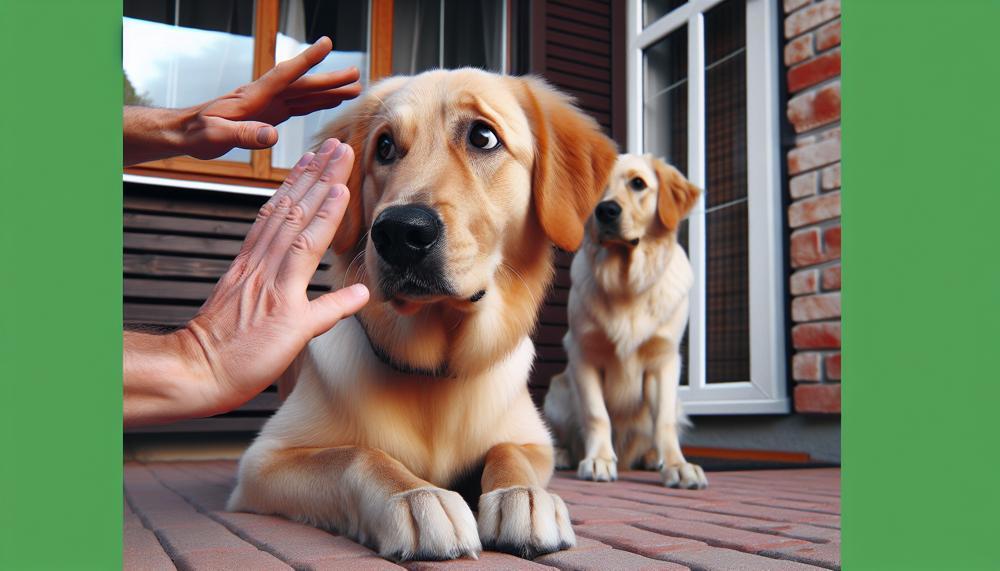Have you ever felt like your dog is avoiding you all of a sudden, leaving you feeling confused and even a bit hurt?
As dog owners, we form deep bonds with our furry companions, making it difficult to understand why they may suddenly shy away from us.
So, why is my dog avoiding me all of a sudden?
There are many reasons why a dog might avoid you, including:
- Anxiety: Loud noises, unfamiliar surroundings, or bad experiences can cause anxiety in dogs. They might also look away if they are feeling anxious or stressed.
- Fear: A dog might avoid you if they are afraid of something in their environment, such as humans or other dogs. A traumatic event or experience, such as another dog attacking your dog, can also cause antisocial behavior.
- Other emotions: A dog who suddenly becomes disinterested in their pack may be experiencing a wide range of emotions, such as jealousy, anxiety, or depression.
Why is my dog suddenly afraid of me?
Table of Contents
Some potential causes for this abrupt shift in behavior include:
- Previous Trauma: A dog may have experienced an unpleasant encounter with their owner in the past, such as punishment or physical harm, leading to fear and avoidance.
- Changes in Routine: Dogs thrive on consistency and structure, so any significant changes in their daily routine or surroundings can trigger feelings of anxiety and avoidance towards their owner.
- Fear of Repercussions: If a dog has been scolded or reprimanded by their owner for misbehavior, they may begin to associate them with negative feelings and avoid them as a result.
- Health Problems: Dogs are masters at concealing pain or discomfort, and if they’re feeling unwell, they may shy away from interacting with their owner.
- Emotional Intuition: Dogs are incredibly perceptive creatures and can sense their owner’s emotions. If they pick up on stress, sadness, or tension in the household, they may avoid their owner as a coping mechanism.
It’s crucial to monitor any changes in your dog’s behavior and attempt to identify any triggers that may be causing them to steer clear of you. With patience and compassion, you can assist your dog in overcoming this behavior and strengthening your bond.
Reasons why your dog is suddenly afraid of you
Dogs are highly intuitive creatures and are sensitive to changes in their environment. As their owners, it’s our responsibility to understand and address these changes to ensure our dogs feel safe and secure.
One surprising reason for your dog’s sudden fear towards you could be due to changes in your own emotions. Dogs are highly empathetic and can pick up on their owner’s emotions easily. If you’ve been feeling stressed or anxious lately, your dog may start to mirror these emotions and become fearful of you. This is because they see their owners as their pack leaders and if the pack leader is feeling unsettled, it can cause anxiety for the rest of the pack.
Another unexpected reason could be due to physical pain or discomfort that your dog is experiencing. Dogs are masters at hiding their pain, so it may not always be obvious when they’re in discomfort. This could lead them to act out in fear or aggression towards you, as they may associate your presence with their pain.
It’s important to keep an eye out for any changes in your dog’s behavior and address them promptly. Regular check-ups with a veterinarian can help identify any underlying health issues that may be causing your dog’s fear towards you.
5 tips on what to do if your dog seems to be scared of you

If your canine companion appears to be afraid of you, it is crucial to take immediate action to help them overcome their fear. Here are 5 tips on what to do if your dog seems to be scared of you:
- Consult with your veterinarian: The first course of action in assisting your fearful dog to overcome their trepidation is to rule out any potential health issues that may be causing their behavior. Physical pain or discomfort can significantly impact a dog’s demeanor and may be the root cause of their fear towards you.
- Create a safe environment: It is vital to establish a secure and calm environment for your dog to help them feel more at ease. Avoid exposing them to any situations or stimuli that may trigger their fear.
- Respect their boundaries: Forcing your dog to confront something that terrifies them can worsen their fear and potentially lead to aggressive behavior. Respect their boundaries and allow them to approach things at their own pace.
- Foster their confidence: Like humans, dogs can also benefit from building confidence. Engage them in activities that they enjoy and praise them for their accomplishments. This will help boost their self-esteem and make them feel more secure.
- Utilize desensitization and classical counterconditioning techniques: These are two proven methods used in behavior modification for fearful dogs. Desensitization involves gradually exposing your dog to the object or situation that causes fear, while classical counterconditioning pairs the exposure with something positive, such as a tasty treat.
Table Format:
| Tip #1: Consult with Your Veterinarian | Ensure there are no underlying health issues causing your dog’s fear. | Ask your vet about potential treatments or medications that may help. |
| Tip #2: Create a Safe Environment | Establish a secure and calm environment for your dog. | Avoid exposing them to any situations or stimuli that may trigger their fear. |
| Tip #3: Respect Their Boundaries | Allow your dog to approach things at their own pace. | Forcing them can worsen their fear and potentially lead to aggressive behavior. |
| Tip #4: Foster Their Confidence | Engage them in activities they enjoy. | Praise them for their accomplishments to boost their self-esteem. |
| Tip #5: Utilize Desensitization and Classical Counterconditioning | Gradually expose your dog to the fear-inducing object or situation. | Pair the exposure with something positive, such as a tasty treat, to create a positive association. |
- Social media: Pet parents can utilize social media platforms such as Facebook, Instagram, and Twitter to post about their experiences and tips. Joining pet parent groups or using relevant hashtags can help reach a wider audience.
- Blogging: Creating a blog dedicated to sharing tips and experiences for handling sudden changes in dog behavior can be an excellent way to connect with other pet parents. These blogs can also incorporate personal anecdotes and perspectives from seasoned dog owners.
- Online forums: There are numerous online forums dedicated to pet care, where pet parents can share their experiences and tips for dealing with unexpected behavior changes in their dogs. These forums allow for discussions and provide a means for pet parents to connect with others.
- Word of mouth: Pet parents can also share their experiences and tips with other pet owners they know personally. This could include friends, family members, or even fellow dog owners at the park.
- Pet parenting classes or support groups: These classes or support groups focus on helping pet parents understand their dogs’ behavior and provide a platform for discussing tips and experiences.
Here is an example showing how pet parents can share their experiences using a table format:
| My Story: | ||
| Issue: | Sudden aggression towards other dogs | Tips: |
| Cause: | New dog introduced into the household | |
| Solution: | Gradually introducing the new dog under supervision | |
| My Story: | ||
| Issue: | Sudden fear of loud noises | Tips: |
| Cause: | Fireworks scared my dog during 4th of July | |
| Solution: | Using noise-cancelling headphones and providing a safe, quiet space for my dog during fireworks season | |
By sharing their experiences and advice, pet parents can offer valuable insights and support for others who may be facing similar issues.
Also Read: Why Does My Dog Nibble My Other Dog?
Conclusion
In conclusion, our canine companions are more than just pets – they are cherished members of our families.
So when they suddenly start avoiding us, it can be confusing and hurtful. However, it’s important to understand that dogs have their own complex emotions and behaviors that may contribute to this sudden change in behavior. It could be due to physical discomfort or underlying psychological issues that require attention.
As responsible pet owners, it’s crucial to pay attention to any changes in behavior and approach our dogs with patience and understanding.
By putting ourselves in their paws and providing reassurance, we can strengthen our bond and help them overcome their fear.






